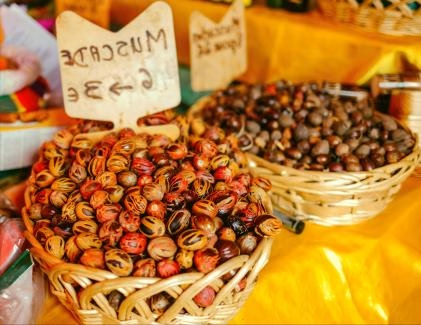Nutmeg is a completely safe spice for cooking, but excessive intake can have negative side effects. What’s going on?
The reason for the “high”
Nutmeg is a common spice, commonly used in meats, baking, beverages, and other cooking applications. The chemical that causes the “high” in excessive amounts is called “myristicin.” It can be understood as a natural essential oil compound found in some plants, such as coriander and dill.
In the human body, the breakdown of myristicin produces compounds that affect the sympathetic nervous system, which is what causes the “high.”
Nutmeg has a long history as a medicine.
- Records of the medicinal use of nutmeg date back to the 16th century, with a case of “nutmeg poisoning” caused by a pregnant woman who consumed 10 to 12 nutmegs. Since nutmeg’s popularity as a spice, it has also been widely used in medicine.
- Nutmeg is said to have been used as a sedative in India as early as 700 BC. Traditional Ayurvedic medicine in India uses nutmeg as a sleep aid, sprinkling it with warm milk before bed to help it fall asleep.
- The Moluccas also mix nutmeg with milk or banana drink as a sleep aid for children. In Europe, older women take ground nutmeg to promote a good night’s sleep. Nutmeg is also widely used as a pain reliever.
- Nutmeg is even more widely used to treat stomach upset. It has been used for centuries in Southeast Asia, India, the Middle East, and Europe to treat stomach aches and cramps, aid digestion, and relieve gas. It’s not just a spice; it’s also a common sedative and psychological soothing agent in folk remedies in China and the Middle East.
However, while there are many historical records suggesting nutmeg’s sedative properties and its use in treating nervous disorders, and while it continues to be used in Arabic and Indian folk medicine, its herbal use has been largely forgotten in modern scientific medicine.
Can we still safely use nutmeg?
Like all foods, nutmeg is a safe spice to use in cooking—the key is dosage. Most recipes, whether baking gingerbread men or making pumpkin spice lattes, use less than a teaspoon of nutmeg.
About 10 grams (about 2 teaspoons) of nutmeg extract is enough to cause toxicity. At doses of 50 grams or more, these symptoms become more severe.
Sprinkling nutmeg on food can add flavor, but high doses can cause organ failure or even death.
There’s not enough research to prove the safety of topical nutmeg use, and not everyone experiences side effects, which vary from person to person. If you have any concerns about side effects, consult a doctor first.
Nutmeg’s unique flavor can always add a fresh touch to your cooking, but remember that any food, including seemingly harmless water, can be fatal in excess.


Leave a Reply